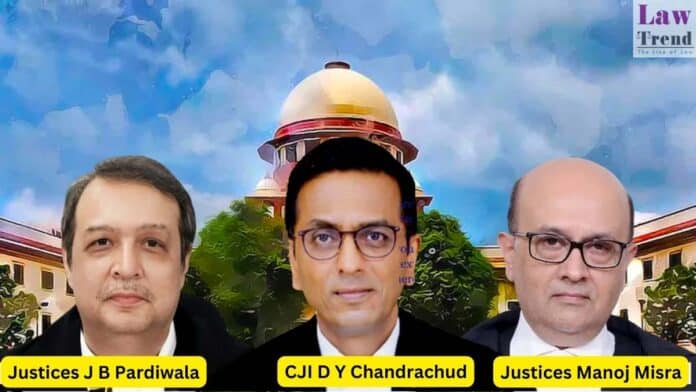The Supreme Court on Tuesday sought a response from the Centre and others on a PIL seeking framing of guidelines for rehabilitation and social reintegration of mentally and physically challenged people who have no one to take care after they turn 18 years of age.
A bench comprising Chief Justice D Y Chandrachud and Justices JB Pardiwala and Manoj Misra took note of the plea filed by KSR Menon, a former journalist, seeking framing of a policy or guidelines to provide aftercare facilities to such people.
The PIL, filed through law firm KMNP LAW AOR’, referred to a provision of the Juvenile Justice (Care and Protection of Children) Act which deals with the “child in need of care and protection”.
Lawyer Abir Phukan, appearing for Menon, a former news agency journalist, said the plea has been filed for rehabilitation of children who are “mentally ill or mentally or physically challenged or suffering from terminal or incurable disease, having no one to support or look after or having parents or guardians unfit to take care”.
The top court issued notices to the Ministry of Women and Child Development and the Chief Commissioner, Persons with Disability Department of the Ministry of Social Justice and Empowerment, and sought their responses within four weeks.
“The Petitioner has preferred the present writ petition, inter alia, in public interest seeking issuance of a writ of Mandamus … direction or guidelines for the rehabilitation and social reintegration of children of Child Care Institutions (CCIs)/Juvenile Homes who are mentally ill or mentally or physically challenged or suffer from terminal or incurable disease considered as child in need of care and protection under the Juvenile Justice (Care and Protection of Children) Act, 2015 and has no one to support them or take care of them upon them turning 18 years,” the plea said.
The petition also sought a direction for maintaining a database of all children who are in need of care and protection.
“The demands are foreseen on the grounds of Right to live a life with dignity under the Constitution and to provide rehabilitation and social re-integration with financial support,” it said.
“Declare that ‘Child in need of care and protection’ (CNCP) recognised under Section 2(14)(iv) of the Juvenile Justice (Care and Protection of Children) Act, 2015 have a fundamental right under Article 21 of the Constitution to aftercare beyond the age of 21 years and till the time they are rehabilitated and integrated in society,” it said.
The plea, which referred to various studies, said according to the 2011 census, the differently-abled population in India stood at 26.8 million.
“In percentage terms, this stands at 2.21 %. There has been a marginal increase in the differently-abled population in India, with the figure rising from 21.9 million in 2001 to 26.8 million in 10 years. There are 14.9 million men with disabilities as compared to 11.8 million women in the country. There appears to be only one aftercare home in Bangalore which caters to children with special needs,” it said.
It said these differently-abled people also have the fundamental right to live a life with dignity under Article 21 of the Constitution.
“The child in need of care and protection as defined under the JJ Act, 2015 is a citizen of India and by virtue thereof, he/she is entitled to live a life of dignity,” it said. PTI SJK SJK
SK




